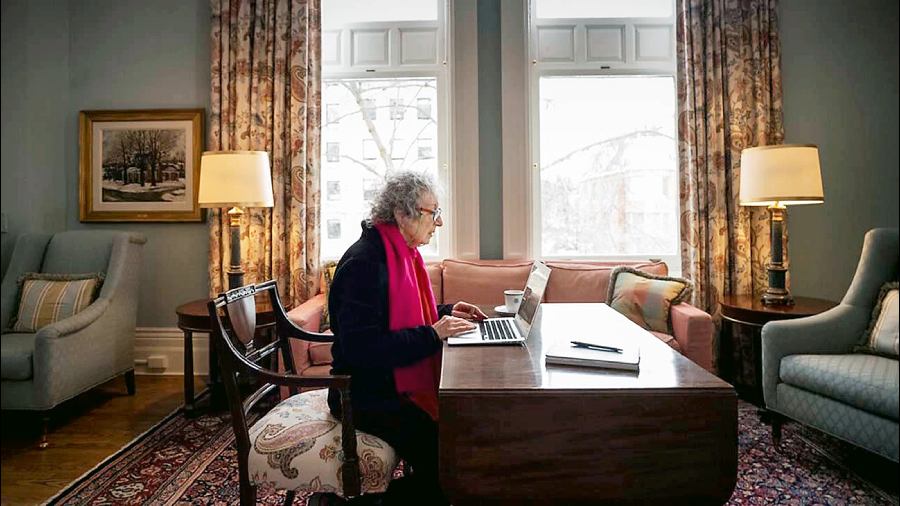Book: Burning Questions: Essays And Occasional Pieces 2004-2021
Author: Margaret Atwood
Publisher: Doubleday
Price: $30
There comes a time in every (famous) author’s life when publishers queue up humbly at their door and ask them to please sort through their email outbox and make a volume out of the odd bits and pieces that come up in their dust-besmirched hands. Luckily for Margaret Atwood, in her heyday, she averaged forty pieces a year; so she has a pretty deep undercroft to mine for neglected beauties. Yes, you read that right, forty. Ah, to be an academic in the twentieth century, when such feats of productivity were possible for the determined and imaginative. Now, even with the mind fired up and the inspiration rolling, most of us are hard put to write four creative pieces a year. Because we are no longer academics in the sense that Atwood was: we are human resource polishers, judged by how many students we ‘process’ and how many reports we write in the format provided.
Atwood has many burning questions to discuss here, but she keeps them from clumping into a blazing, unmanageable mass by intercalating them with lighter works, about her friends, her life, her travels and puzzlements. If you’ve never read anything by her till now, this is not the place to start: this is a book for the fans, the scholars and the activists. If you are already acquainted with Atwood’s fiction, or even if you’ve only watched The Handmaid’s Tale (based on her 1985 novella), you can probably gain something from reading these short pieces, even if it’s just a bit of context.
Of course, one can see a darkening in these pieces as we move into the twenty-teens, reflecting the turn our world took even before the pandemic crushed so many. 2016 was the year Hilary Clinton was hounded out of the US presidential race, and also the year The Handmaid’s Tale began production. As a Canadian, Atwood has the freedom to comment on US politics in a way that American citizens would find both difficult to pull off and disturbing to think through.
But here I come to a problem. I have always desperately wanted to like Atwood’s work, but something has held me back. Is it the fact that she can suddenly default to what seems like a reactionary or, at best, ill-conceived take on events? I remind myself she was born in 1939, and placed beside that fact the freshness of her ideas that is all the more striking.
I think my unease stems not from anything to do with Atwood herself, but with her culture and the subtype of feminism she represents (although like Ursula Le Guin she is at pains to tell the world she is not a feminist). I realised this when I felt the same type of unease while watching Deepa Mehta’s Leila.
For some women of a certain generation, class and background in the Eurocentric world, no matter what their ethnicity, there is a tendency to focus like a mongoose on the snake (the problem) and to be sceptical or resistant to solutions. This is an artefact of privilege, because if you are not privileged you sure as hell want to get your hands on that solution so your wounds will stop hurting. That is not to say those women have no wounds: of course they do. But more often than not, they are personal wounds, not institutional ones. There is no institutional solution to personal wounds: those must be remedied by self-care and social support, but institutional wounds lead to a very different kind of grieving, and they need a different kind of vision to be fixed. Very often, they are caused by everything, and to fix them, we need to make everything change (to quote Atwood, naturally).
I loved Oryx and Crake, but I had mixed feelings about The Year of the Flood, mostly for the reasons stated above. God’s Gardeners got a raw deal from their creator. You can see this very starkly if you contrast The Year of the Flood with Octavia Butler’s Parable of the Talents or, more specifically, to the little settlement of Acorn in that book. That’s the path I recognise: towards a true community, even if the way is long and hard and the travellers full of doubt. But that is my personal preference.
There have been so many changes in this century, so many gut-wrenching shifts of foundation, that the old thought-systems are faltering and leading us to barren lands. Paradoxically, I do not think that the The Handmaid’s Tale can get us out of the Roe vs Wade pickle because like Karl Marx’s riff on capitalism, it occupies the same universe as its enemy. And the hardest thing for any thinker to do is to escape into a new one.










